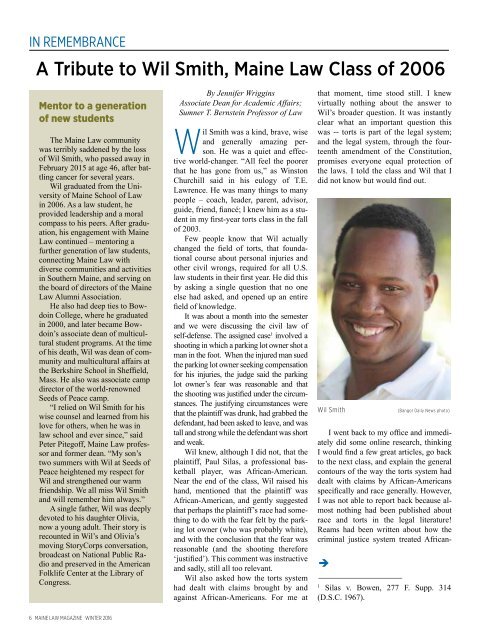Maine Law
10ji10
10ji10
Create successful ePaper yourself
Turn your PDF publications into a flip-book with our unique Google optimized e-Paper software.
IN REMEMBRANCE<br />
A Tribute to Wil Smith, <strong>Maine</strong> <strong>Law</strong> Class of 2006<br />
Mentor to a generation<br />
of new students<br />
The <strong>Maine</strong> <strong>Law</strong> community<br />
was terribly saddened by the loss<br />
of Wil Smith, who passed away in<br />
February 2015 at age 46, after battling<br />
cancer for several years.<br />
Wil graduated from the University<br />
of <strong>Maine</strong> School of <strong>Law</strong><br />
in 2006. As a law student, he<br />
provided leadership and a moral<br />
compass to his peers. After graduation,<br />
his engagement with <strong>Maine</strong><br />
<strong>Law</strong> continued – mentoring a<br />
further generation of law students,<br />
connecting <strong>Maine</strong> <strong>Law</strong> with<br />
diverse communities and activities<br />
in Southern <strong>Maine</strong>, and serving on<br />
the board of directors of the <strong>Maine</strong><br />
<strong>Law</strong> Alumni Association.<br />
He also had deep ties to Bowdoin<br />
College, where he graduated<br />
in 2000, and later became Bowdoin’s<br />
associate dean of multicultural<br />
student programs. At the time<br />
of his death, Wil was dean of community<br />
and multicultural affairs at<br />
the Berkshire School in Sheffield,<br />
Mass. He also was associate camp<br />
director of the world-renowned<br />
Seeds of Peace camp.<br />
“I relied on Wil Smith for his<br />
wise counsel and learned from his<br />
love for others, when he was in<br />
law school and ever since,” said<br />
Peter Pitegoff, <strong>Maine</strong> <strong>Law</strong> professor<br />
and former dean. “My son’s<br />
two summers with Wil at Seeds of<br />
Peace heightened my respect for<br />
Wil and strengthened our warm<br />
friendship. We all miss Wil Smith<br />
and will remember him always.”<br />
A single father, Wil was deeply<br />
devoted to his daughter Olivia,<br />
now a young adult. Their story is<br />
recounted in Wil’s and Olivia’s<br />
moving StoryCorps conversation,<br />
broadcast on National Public Radio<br />
and preserved in the American<br />
Folklife Center at the Library of<br />
Congress.<br />
By Jennifer Wriggins<br />
Associate Dean for Academic Affairs;<br />
Sumner T. Bernstein Professor of <strong>Law</strong><br />
Wil Smith was a kind, brave, wise<br />
and generally amazing person.<br />
He was a quiet and effective<br />
world-changer. “All feel the poorer<br />
that he has gone from us,” as Winston<br />
Churchill said in his eulogy of T.E.<br />
<strong>Law</strong>rence. He was many things to many<br />
people – coach, leader, parent, advisor,<br />
guide, friend, fiancé; I knew him as a student<br />
in my first-year torts class in the fall<br />
of 2003.<br />
Few people know that Wil actually<br />
changed the field of torts, that foundational<br />
course about personal injuries and<br />
other civil wrongs, required for all U.S.<br />
law students in their first year. He did this<br />
by asking a single question that no one<br />
else had asked, and opened up an entire<br />
field of knowledge.<br />
It was about a month into the semester<br />
and we were discussing the civil law of<br />
self-defense. The assigned case 1 involved a<br />
shooting in which a parking lot owner shot a<br />
man in the foot. When the injured man sued<br />
the parking lot owner seeking compensation<br />
for his injuries, the judge said the parking<br />
lot owner’s fear was reasonable and that<br />
the shooting was justified under the circumstances.<br />
The justifying circumstances were<br />
that the plaintiff was drunk, had grabbed the<br />
defendant, had been asked to leave, and was<br />
tall and strong while the defendant was short<br />
and weak.<br />
Wil knew, although I did not, that the<br />
plaintiff, Paul Silas, a professional basketball<br />
player, was African-American.<br />
Near the end of the class, Wil raised his<br />
hand, mentioned that the plaintiff was<br />
African-American, and gently suggested<br />
that perhaps the plaintiff’s race had something<br />
to do with the fear felt by the parking<br />
lot owner (who was probably white),<br />
and with the conclusion that the fear was<br />
reasonable (and the shooting therefore<br />
‘justified’). This comment was instructive<br />
and sadly, still all too relevant.<br />
Wil also asked how the torts system<br />
had dealt with claims brought by and<br />
against African-Americans. For me at<br />
that moment, time stood still. I knew<br />
virtually nothing about the answer to<br />
Wil’s broader question. It was instantly<br />
clear what an important question this<br />
was -- torts is part of the legal system;<br />
and the legal system, through the fourteenth<br />
amendment of the Constitution,<br />
promises everyone equal protection of<br />
the laws. I told the class and Wil that I<br />
did not know but would find out.<br />
Wil Smith<br />
I went back to my office and immediately<br />
did some online research, thinking<br />
I would find a few great articles, go back<br />
to the next class, and explain the general<br />
contours of the way the torts system had<br />
dealt with claims by African-Americans<br />
specifically and race generally. However,<br />
I was not able to report back because almost<br />
nothing had been published about<br />
race and torts in the legal literature!<br />
Reams had been written about how the<br />
criminal justice system treated African-<br />
è<br />
(Bangor Daily News photo)<br />
1<br />
Silas v. Bowen, 277 F. Supp. 314<br />
(D.S.C. 1967).<br />
6 MAINE LAW MAGAZINE WINTER 2016


